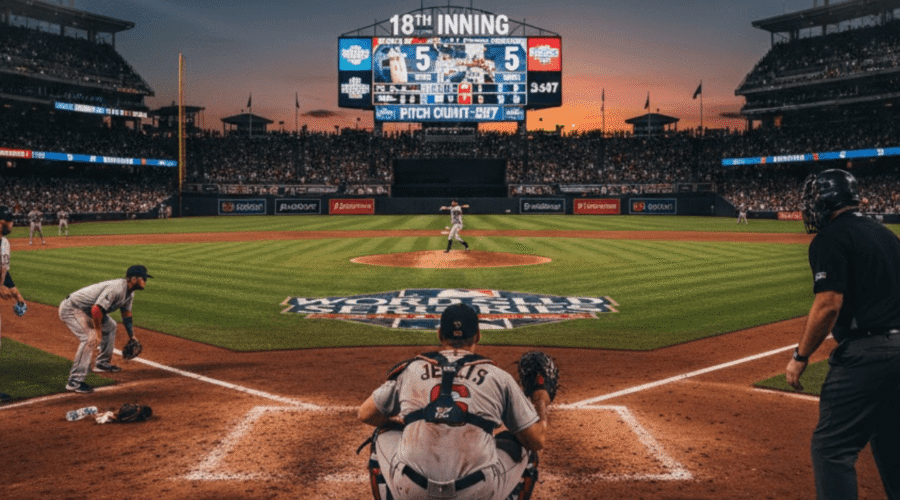The Longest MLB World Series Games Ever: Last 5, 10, 20 & 30 Years
When the final out refuses to come and innings pile up like snowdrifts, baseball transforms from sport into an endurance test. The longest game in MLB World Series history now stands at 18 innings—a mark first set in 2018 and matched again in 2025. But understanding baseball’s longest games means looking beyond just the World Series, examining how strategy shifts when the clock keeps ticking and pitchers keep warming up.
Key Summary: Fast Facts on Baseball’s Longest Games
- Longest World Series game (innings): 18 innings—achieved twice. Game 3 of the 2018 Dodgers vs. Red Sox first set the record, then Game 3 of the 2025 Dodgers vs. Blue Jays matched it.
- Longest MLB game ever (innings): 26 innings—Brooklyn Robins vs. Boston Braves, May 1, 1920. This regular-season marathon remains untouched more than a century later.
- Most innings in MLB history: That same 26-inning game from 1920 holds the all-time record for most innings played in an MLB game.
- Strategy matters: When games stretch beyond regulation, every decision—from the MLB intentional walk to bullpen management—becomes magnified under playoff pressure.
How We Measure “Longest”—Innings vs. Clock Time
When fans ask “what is the longest MLB game ever,” they’re usually thinking about innings. But there’s another way to measure: elapsed time. A game can last five hours without reaching double-digit extra innings if there are multiple pitching changes, replay reviews, and commercial breaks. World Series games often become the longest by time because the stakes slow everything down—managers overthink, reviews multiply, and television demands its due.
For this discussion, we’re focusing primarily on innings, the traditional baseball yardstick. By that metric, the longest MLB baseball game in history is that 26-inning affair from 1920, while the longest postseason MLB game caps at 18 innings.
The Longest MLB Game World Series: 18-Inning Epics
2018: Dodgers vs. Red Sox (Game 3)
The 2018 World Series Game 3 at Dodger Stadium rewrote the postseason record books. Playing into the early hours, the Dodgers and Red Sox battled through 18 innings—nine extra frames that established the benchmark for most extra innings in MLB World Series history. This wasn’t just long by innings; it became one of the longest MLB games by elapsed time as well, with pitching changes, strategic timeouts, and high-stakes at-bats stretching the contest past seven hours.
The game showcased modern baseball strategy at its finest and most exhausting. Managers cycled through nearly their entire bullpen rosters, made repeated pinch-hit decisions, and employed intentional walks to navigate dangerous hitters. Position players were moved around the diamond like chess pieces, and the endurance test affected everyone from starting players to mop-up relievers suddenly thrust into high-leverage situations.
2025: Dodgers vs. Blue Jays (Game 3)
In October 2025, history repeated itself—again at Game 3, again involving the Dodgers. This time facing the Blue Jays, both teams pushed through 18 innings to tie the World Series record. Contemporary coverage emphasized how this game became an instant classic, noted for record numbers of pitchers used and strategic maneuvering that included multiple intentional walks of a particularly dangerous Blue Jays hitter.
What makes these 18-inning games remarkable is their rarity. Modern bullpen construction, with specialized relievers and pitch-count monitoring, was supposed to make such marathons extinct. Yet twice in eight years, World Series teams found themselves locked in battles that harked back to baseball’s earlier era.
Longest Game in MLB World Series: Last 5 Years (2021-2025)
Looking at recent history, the 2025 Game 3 between the Dodgers and Blue Jays dominates the five-year window as both the longest game in MLB World Series terms and a tie for the all-time World Series innings record. This mid-2020s throwback felt almost anachronistic given modern baseball’s efficiency emphasis. Managerial strategy became theater: bullpen carousels, pinch-runners deployed in the 15th inning, and calculated intentional walks to set up favorable matchups.
Why don’t we see more games like this? Modern roster construction, pitch limits, and the introduction (then removal, then reintroduction in various forms) of extra-inning rules like automatic runners have all influenced game length. The 2025 marathon proved these constraints haven’t eliminated the possibility of epic endurance contests—they’ve just made them rarer and more special.
Read more: MLB Awards 2025, MVP, Cy Young, Rookie of the Year, Gold Glove: Winners, Odds, Schedule
Longest MLB Game Innings: Last 10 Years (2015-2025)
Within a decade’s view, the 2018 Dodgers-Red Sox Game 3 stands as the defining example before being joined by the 2025 game. That 2018 contest represented the longest game in MLB postseason history at the time and remains a touchstone for discussions about most innings in an MLB game during the playoff stretch.
Other notable postseason marathons in this window include several deep extra-inning affairs in earlier playoff rounds—wild card games, division series, and league championships that tested teams before they even reached the Fall Classic. But for the World Series specifically, these two 18-inning epics are the landmarks.
Most Innings in MLB Game: Last 20 Years (2005-2025)
Stretching back two decades, the 2005 World Series Game 3 between the White Sox and Astros long held the modern-era title. At 14 innings and 5 hours, 41 minutes, this Houston-based thriller was the longest World Series game by both innings and time for more than a decade. It tied innings records with much older games and became the benchmark that the 2018 game would eventually surpass.
The gap between 2005 and 2018 demonstrates how uncommon these marathons truly are. Thirteen years passed before the World Series saw another game push into comparable extra-inning territory, and when it did, it leaped from 14 to 18 innings—a substantial jump that reflects how completely teams were matched in 2018.
Longest Game in MLB History: Last 30 Years (1995-2025)
Across three decades of World Series play, the same peaks emerge: the 2005 14-inning game, and the 2018 and 2025 18-inning epics. This 30-year lens reveals the extraordinary nature of double-digit extra-inning World Series games. They’re not just rare—they’re generational events that fans remember for decades.
The evolution of baseball strategy over this period is also shown clearly. The 2005 game employed more traditional bullpen management; the 2018 and 2025 games reflected hyper-specialized relief pitching, where multiple pitchers might face just one or two batters. Despite these strategic shifts, or perhaps because of them, the longest MLB game World Series record has grown from 14 to 18 innings.
What’s the Most Innings Played in an MLB Game—Beyond the World Series
While the World Series ceiling sits at 18 innings, the all-time MLB record for most innings ever played in MLB belongs to a 1920 regular-season game: Brooklyn Robins versus Boston Braves, a 26-inning, 1-1 tie played on May 1, 1920. This remains the longest baseball game ever MLB has witnessed by innings.
Both starting pitchers in that game—Leon Cadore for Brooklyn and Joe Oeschger for Boston—threw all 26 innings. That feat is literally impossible under modern rules and baseball philosophy. Today’s pitch counts, specialized bullpens, and player safety protocols make breaking the 26-inning record virtually unthinkable.
For postseason play specifically, 18 innings represents the ceiling. The postseason has seen 18-inning games multiple times—including the 2014 NLDS between the Giants and Nationals—but never longer. So when discussing the longest postseason MLB game, we’re looking at an 18-inning maximum that the World Series has now matched.
Strategy in Marathon Games: The MLB Intentional Walk and Bullpen Chess
When a game extends past the ninth inning, baseball becomes a different sport. Every decision carries magnified weight. Should you intentionally walk the cleanup hitter to face the number-five batter with runners on base? Do you use your best remaining reliever now, or save him for a hypothetical later inning? Is a pinch-runner worth burning a position player for?
The MLB intentional walk becomes a crucial tactical tool in these situations. In the 2025 18-inning World Series game, one particularly dangerous Blue Jays hitter received multiple intentional walks as Dodgers management tried to neutralize him and create more favorable matchups. This cat-and-mouse game between managers defines extra-inning baseball.
Bullpen usage transforms from science to survival. Teams enter games with maybe seven or eight relief pitchers available. By the 15th inning, managers are often using pitchers they’d hoped never to deploy in close games. Position players sometimes even pitch to preserve the last remaining arms. The most innings in MLB game situations test organizational depth in ways regular nine-inning affairs never do.
Why These Games Matter
Marathon games represent baseball stripped to its essence: strategy, endurance, and the refusal of either team to yield. They expose roster depth, reward teams that prepare for contingencies, and create heroes from unlikely sources—the backup catcher who delivers in the 16th, the mop-up reliever who suddenly faces the heart of the order with the game on the line.
The longest MLB game ever (26 innings) happened when baseball was fundamentally different—no pitch counts, no specialized relievers, just two hurlers throwing until their arms gave out or the game ended. The longest game in MLB World Series history (18 innings, twice) happened in the modern era, proving that even with all our efficiency and specialization, baseball can still surprise us with its capacity for marathon drama.
Conclusion: Records Made to Be Matched (Maybe)
The 18-inning mark for the longest game in the MLB World Series stands as a modern monument to endurance and competitive balance. Matched twice—in 2018 and 2025—it represents the ceiling of what playoff baseball can stretch to under current rules and approaches. Meanwhile, the all-time MLB record of 26 innings from 1920 seems untouchable, a relic from when baseball was played by different rules and different philosophies.
Whether measured by innings or elapsed time, these marathon games become instant classics because they’re so rare. They remind us that no matter how much baseball evolves, how specialized pitching becomes, or how analytically teams approach roster construction, the game still has the capacity to surprise—to extend beyond our expectations and create records we thought were impossible.
The next time someone asks,”What is the longest MLB game ever,” you’ll know the answer depends on context: World Series or regular season, innings or time, modern era or all-time. But whatever the frame, these games represent baseball at its most elemental—two teams refusing to lose, playing until someone finally, inevitably, does.
FAQ: Quick Answers on Baseball’s Longest Games
Q: What is the longest MLB World Series game ever?
A: By innings, the longest World Series games reached 18 innings—Game 3 of the 2018 World Series (Dodgers vs. Red Sox) and Game 3 of the 2025 World Series (Dodgers vs. Blue Jays) both hit this mark.
Q: What is the longest baseball game ever MLB?
A: The all-time MLB innings record is 26 innings, set during a 1-1 tie between the Brooklyn Robins and Boston Braves on May 1, 1920.
Q: What’s the most innings ever played in an MLB game?
A: 26 innings, from that same 1920 Brooklyn Robins vs. Boston Braves game. This regular-season record has stood for over a century.
Q: What was the longest postseason MLB game?
A: Postseason games have reached 18 innings multiple times, including the 2014 NLDS between the Giants and Nationals, the 2018 World Series, and the 2025 World Series.
Q: Do managers use intentional walks in extra-inning marathons?
A: Absolutely. MLB intentional walk strategy becomes critical in extra innings, as managers try to avoid bad matchups and protect runs. Recent long World Series games featured multiple intentional walks as exhausted bullpens faced elite hitters repeatedly.
Q: Could we see a game longer than 18 innings in the World Series?
A: It’s possible but increasingly unlikely. Modern bullpen usage, pitch counts, and potential rule changes (like automatic runners in extra innings) make extreme marathon games rarer. But as 2018 and 2025 proved, the right matchup of evenly-matched teams can still produce historic endurance tests.


